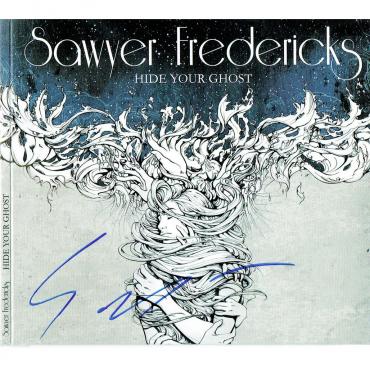Young Songwriter Teeters Strikingly With Sophisticated Angst & Beauty of Drake & Martyn

With a vocal tone and inflection style 0n the first track similar to the late folk singer Karen Dalton — Sawyer Fredericks takes Karen’s style several levels higher with his tantalizing, yet melancholy and somewhat monochrome original songs – 25-years after Ms. Dalton’s death. Sawyer’s lyrics alone teeter strikingly on the angst and beauty of the late, now legendary English singer-songwriter Nick Drake as well.
Sawyer’s voice takes a little getting used to. But then so would Tom Waits, Valerie June, and Iris Dement. But what has value here is the wealth of musical vitality that infuses many of these tunes and it is there despite being a little dark. It has a gutsiness and punch that is delivered with sincerity.
Fredericks doesn’t exactly look like what he showcases — but he does not try to be wholly an entertainer but to come off as a 0ld-world troubadour who goes to a very deep well of inspiration and brings his message to the surface — succinctly and with relevancy. The Karen Dalton comparisons are obvious with the first two tracks. The title tune “Hide Your Ghost,” and “Stone.” But, by track three “Should’ve Known Better,” adds a guitar string pluck jump-beat sear that journeys into David Gray and Dave Matthews territory. Not as imitation, but as a carrot on a stick in front of a burro. This does get interesting. But, let me clarify: because Sawyer still carries that Karen Dalton edge in his technique when he sings and sounds a little like Gray or Matthews it isn’t from a place of imitation as I noted. Just influence. And they are great influences to mix together.
It’s a melding of these unique styles that demonstrates Sawyer Frederick’s punchy originality. He has taken three colored threads, sewn them together and created a different color. His own color.
Fortunately, despite Sawyer’s somewhat androgynous appearance – (I’m from New York, we call it as we see it), when he wears the hat with his long hair he looks like he could have been Patti Smith’s younger brother back in the 70’s. And that is not a bad thing. At least Sawyer knows a “look” is as important as good song material and singing. It’s a complete package.
Sawyer doesn’t have a whiny voice — praise the Lord — like so many of today’s young singer-songwriters. He is his own person and I will defend his image. He still comes across, for today, as an original. He tries not to follow any current musical trend. That is to be admired.
I must emphasize again — his vocal takes some getting used to – not that it hasn’t been done already by others — but the fuel in his melodies and lyrics will eventually overcome that drawback. If even there is a drawback. The material is there – and it’s strong enough to overwhelm it.
“Broken Home,” is a powerful track. A son is blamed by his father that his mother is gone: “…. screaming at me, saying it’s your fault that she’s gone, so get out of my house, you worthless son, he slams the door…” This is not run of the mill songwriting or subject matter. Yes, we have had equally compelling tunes in the past – “Luka,” by Suzanne Vega (child abuse). “I’ve Got to Go Now,” by Toni Childs (spousal abuse). “I Really Must Be Going,” by Joan Armatrading (affair with a married man).
But, a tune like this from a man? It’s painful to listen to but it carries that magic Nick Drake always sewed brilliantly into his melodies. Tom Waits once said that he loved beautiful melodies set to tragic stories. That is a great contrast. Many don’t realize that the classic “Mack the Knife” was a murder.
For the most part, Sawyer’s tracks are spare in their presentation but it doesn’t detract or deny each song’s potential. The album “Hide Your Ghost,” adheres strongly throughout to its title. Each song has a haunting quality, a sophisticated yarn and each is fueled uniquely. In the tune “Half a Mind,” Sawyer asserts himself at times with vocal tonality that suggests the anger that possessed the excellent singer-songwriter Harry Chapin (“Taxi,” “Cats in the Cradle” & “WOLD”) at times. Sawyer sings with a cool, narrative style near the conclusion that is not corny but dramatic and ingrained with distinctive imagery. All this gutsiness with no musical aggression just suave motivated and angry vocals. The anger of someone who doesn’t want to be angry but is because of an emotional conflict.
Concluding brilliantly with: “…cause I’ve got a mind to kill you, and the other half is still in love.” This is not the stuff of amateur songwriters.
As the album moves on Sawyer moves away from the Karen Dalton-David Gray world and starts to shape his vocal into something focused on his own vocalese.
“Window,” with its pounding Peter Primamore piano notes and Sawyer’s charged vocals delivers against his pensive guitar which pushes back at his bustling vocal. This is a good tactic. The contrast is excellent. For some, the songs may be too dark but what gives these individual tunes their justification is the amount of people who will indeed relate to these scenarios and little novellas.
While Sawyer doesn’t write his lyrics with the poetic originality of say, a Tom Waits, Leonard Cohen, Shane McGowan or Joni Mitchell. He does write with the most powerful words he can string together, and he does it economically. Nothing is wasted. Everything resounds and is resilient. There is nothing weak or clichéd about Sawyer’s lyrical tales. On “Red Memories,” this track will appeal to guitarists with Jerome Gooseman’s wailing and sliding notes that are stridently set against Sawyer’s acoustic guitar.
One of the heavier songs on this collection is “Gasoline,” where the bass (Art Fredericks) holds down the melody line while the drums are brushed like shuffling feet, and the guitars wind around your head like an eerie sound like a Madrugada breeze. This is a very atmospheric tune and it’s effective as well.
While Sawyer doesn’t possess the moody intensity of Nick Drake (“Northern Sky”) – and is not troubled like Drake was, he does have a fascinating well-defined arresting blend of angst and apprehension in his showcase. That quality is what is attractive because it compels you to listen to what he’s saying. “Moving the Sky,” could’ve been covered by the late English-singers Nick Drake or John Martyn (“May You Never”). “Wonder if my sun will ever come, wonder if this moon will ever fall…” Typical of these songwriters styles.
The gentleness, the clipped lyrics strung together in a savvy honest performance – songs that were written by inspiration. The vocal is rich in its circuitry of poignancy. There is a subtle loveliness in this despite its surreal lines, and sad, yet appealing tone. So, while I am not certain if this music would catch on in this musical age with its tons of funkiness, clichés and wimpy vocalizing. Sawyer Fredericks bravely conjures his short stories with convincing words, sensitivity in his melodies, and he does it all with no posturing or grand standing. No soaring brass or grab you by the throat guitar solos, just soul-adhering messages of reality and nuances. So, as a comparison to differing music: while the young will gravitate to video games with its comic book illustrations and color — the classic paintings will still hang in museums throughout the world in ornate frames and they will be there a hundred years from now…the video games? Recycled. Sawyer’s music while not classical…is not a video game either.
“Angel’s Skin,” is the tune with the most gin and juicy moments. This has the delicate devilish prickly ambiance that lots of younger listeners perk their ears up for. It has that Dead Can Dance (Brendan Fraser) wine cellar and cobweb vocal. It has a little of that Swans (Michael Gira) gritty pathos and electrifying weirdness. All this song really needs to ignite imaginations is a little spookier other-worldly female soprano – like Jarboe (Swans) — fleeting around the male vocals like an annoying mosquito but punctuating as it goes.
There is some female vocalizing in there somewhere, but not strong enough, it doesn’t grip. And this tune – should grip the listener’s throat. It’s one of my favorites.
Concluding the set is a pensive acoustic song “How Beautiful,” and this reminds me a little of the late Tom Rapp (who later became a lawyer) of the great band Pearls Before Swine who had recorded for a major label back in the 1970’s. Rapp also had a quirky voice and phantasmagoria lyrics. He recorded many albums with his band and solo. So, someone bought his stuff.
Yet, at times Rapp would pen something short and beautiful like this Sawyer Fredericks song. On his early albums, Rapp had a female named Elisabeth who sang backup and it intensified the drama of each track. “These Things Too,” is one of the albums that had the best melodies. “Frog at the Window,” comes to mind.
By the way, some of you are probably wondering Tom Rapp who? It was Tom Rapp’s song “Rocket Man,” that influenced Elton John to write his own “Rocket Man.” So, back then, Elton John was listening to Tom Rapp’s Pearls Before Swine. Rapp was a little more invested in weird than Sawyer Fredericks, but these two men could’ve been kindred spirits. They probably would’ve made a great songwriting team.
All songs were written and produced by Sawyer Fredericks except “Should’ve Known Better,” which was co-produced with Ariel Shafir. The 11-track, 55-minute album was recorded in Woodstock, NY. The album artwork and graphics were created by Nina Pfeiffer including the art in the 12-page stitched lyric insert booklet.
Website: https://www.sawyerfredericks.com/news/03-09-18/hide-your-ghost-cd-release
Facebook: https://www.facebook.com/SawyerFredericks
Disclaimer: The opinions expressed in this review/commentary are those of the author and do not necessarily reflect the official position of No Depression. All photography is owned by the respective photographers and is their copyrighted image; credited where photographer’s name was known & being used here solely as a reference and will be removed on request. YouTube images are standard YouTube license.
John Apice / No Depression / September 2018





